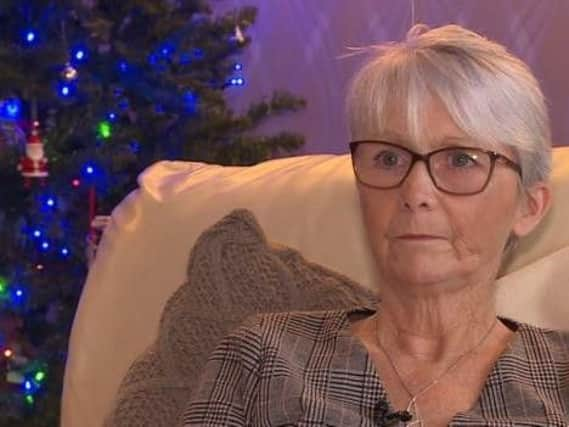Edinburgh mum welcomes life-prolonging ovarian cancer drug which has given her 'new lease of life'


Jennifer Jennings, was diagnosed with ovarian cancer in 2015. She underwent chemotherapy followed by surgery and another three months of chemo.
In December that year the 59-year-old was told there were no longer any visible signs of the cancer and she received check-ups every three months but in January 2018 the cancer came back.
Advertisement
Hide AdAdvertisement
Hide AdJennifer, from Drumbrae in Edinburgh, went through another six rounds of gruelling chemotherapy and then started taking olaparib.
Following the SMC decision the tablets will now be an option for patients with newly diagnosed BRCA-mutated genes advanced ovarian cancer who have responded to chemotherapy.
A trial has found that for patients given the tablets it can be three years before the disease progresses.
Just over 600 women are diagnosed with ovarian cancer in Scotland every year and two-thirds are diagnosed when the disease is more advanced, when the chances of survival are lower.
Jennifer, who has two grown-up children Jaimie, 35 and Robyn, 36, lost her mother who was just 41 to cancer of the womb in 1972.
She said: "We're now past the year marker, which for me is really good.
"That's helped me feel a bit more positive that my cancer's under control. It's let me get on with my life - I'm not continually thinking 'When's it coming back?'. I'm more positive about the future."
A scan last week did not show any significant change.
Advertisement
Hide AdAdvertisement
Hide Ad"That tells me that the olaparib is doing its job," she said.
Jennifer, a Police Scotland finance specialist, is back working full-time and is now looking forward to her first granddaughter arriving in January.
She said: "Maybe a year ago I was full of what ifs.
"I didn't know how I was going to be. How frail I was going to be. But this has given me positivity and it's given me a new lease of life.
"I'm able to be back at work full time which I'm enjoying and I just feel I've got my life back on track. Back to where I was in 2016 after my treatment finished the first time."
More than 350 women die of the disease in Scotland each year.
Marie-Claire Platt, head of public affairs and research at Ovarian Cancer Action, said: "Today's news marks a significant advancement in how we can treat BRCA-mutated ovarian cancer in Scotland."
Rachel Downing, head of policy and campaigns at Target Ovarian Cancer, said: "We are thrilled that it has been approved. For those women that can access it its results have been tremendous."
Advertisement
Hide AdAdvertisement
Hide AdProfessor Charlie Gourley, UK lead of the SOLO-1 Clinical Trial and clinical director of the Cancer Research UK Edinburgh Centre, said: "Olaparib is a practice changing treatment that exploits the Achilles' heel of BRCA-mutated ovarian cancer.
"The unprecedented results of the SOLO-1 clinical trial show that giving olaparib after surgery and chemotherapy to patients who are newly diagnosed with BRCA-mutated ovarian cancer result in approximately three additional years before their disease progresses, giving them longer before further rounds of chemotherapy are needed.
"Although the data are immature, we are hopeful that this treatment may also increase overall survival in the future.
"It is now imperative that all women with ovarian cancer are tested for the BRCA mutation to give them the benefit of this therapy wherever possible."